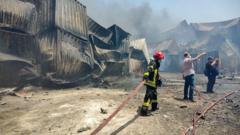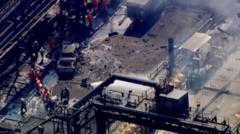In the aftermath of a deadly explosion at Iran's largest container port, government officials attribute the disaster to negligence and safety violations. With over 1,000 injuries reported and fatalities rising, the incident raises concerns over regulatory compliance in hazardous materials handling.
Iran Attributes Massive Port Explosion to Negligence Amid Rising Casualties

Iran Attributes Massive Port Explosion to Negligence Amid Rising Casualties
Investigations reveal that negligence and safety violations contributed to the catastrophic explosion in Bandar Abbas, with the death toll climbing to 70.
Iran's interior minister has pointed to negligence as a significant factor in the catastrophic explosion at Shahid Rajaee port in Bandar Abbas, which has now claimed the lives of at least 70 individuals. Eskandar Momeni stated that the massive blast on Saturday was the result of "shortcomings," particularly expressing concerns over safety protocol violations. As extinguishing efforts continued into Monday, the number of injured individuals had surpassed 1,000.
The explosion erupted from imported cargo that caught fire, but question remains around its origins. Despite various reports about the nature of the cargo, Iran's defense ministry denied allegations that the incident involved shipments of missile fuel chemicals, asserting that foreign media had propagated false information.
Moreover, questions have emerged regarding the registration of the cargo involved. The Customs Administration revealed that the cargo had not been formally declared before the explosion, leading to serious implications for the firms operating in the area. The CEO of Sina Marine and Port Services Development Company noted that the incident was attributable to repeated errors related to hazardous materials declarations.
As damage assessment unfolds, Hormozgan Governor Mohammad Ashouri Taziani indicated that approximately 1,500 hectares or two-thirds of the port area had been severely impacted. Cleaning operations are anticipated to stretch over the next week or two as the region aims to return to normalcy.
Furthermore, investigations suggest the possibility that sodium perchlorate, a solid chemical typically associated with ballistic missiles, may have been involved. A maritime risk consultancy reported the receipt of such a shipment in the previous month, but Iranian authorities continue to deny the implications of military material handling in the incident.
While the nation mourns, public sentiment is reportedly shifting towards frustration and fury directed at the authorities for their alleged negligence leading to the disaster, reflecting broader anxieties over safety and regulatory compliance in critical infrastructure operations.



















